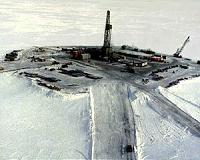 |
Baghdad (AFP) Feb 6, 2011 Nuri al-Maliki's announcement that Iraq will honour Kurdish oil deals with foreign firms will boost its coffers, but experts said Sunday the longer term impact of his remarks may well be more significant. The Iraqi prime minister's concession came in an interview with AFP on Saturday, signalling an end to a stand-off between the central government and the autonomous Kurdish region after the latter cut off exports of oil in October 2009 in a row over payments to foreign firms. In the interview, Maliki said Iraq's oil ministry "accepted these contracts because the nature of the extraction in Kurdistan is different from (the southern province of) Basra," referring to two production-sharing contracts signed with Norway's DNO and Turkey's Genel Enerji. "Maliki's comments are historical because they mark the defeat of the centralist oil policy pursued by his previous oil minister, (current deputy prime minister) Hussein al-Shahristani, since 2006," said Reidar Visser, an Iraq expert who runs the historiae.org website. "He (Maliki) recognises the Kurdish contracts and their higher level of profit based on the different natural conditions for oil drilling in Kurdistan compared with the south of Iraq. This establishes a precedent that in theory could apply to new fields in the future." Maliki told AFP on Saturday that there was "a need for bigger efforts" in Kurdistan, while in oil-rich Basra province, oil "is closer to the surface." "It's difficult to have service contracts in Kurdistan but it's normal to have them in southern Iraq," he added. While Kurdistan's contracts are based on profit-sharing, Baghdad prefers the use of a service fee, whereby firms are paid a fixed sum for each additional barrel of oil they extract above current production. In 2009, the central government awarded 11 contracts to international energy firms based on the service fee model. Kurdish authorities, meanwhile, have signed some 30 contracts with foreign firms in addition to the DNO and Genel Enerji deals, though the latter two are the only ones producing oil presently. Ruba Husari, the Baghdad-based founder and editor of the IraqOilForum.com website, said Maliki's remarks could set a precedent for future oil deals signed by Iraq, which holds the world's fourth-largest proven crude reserves. "Even though Maliki was talking about the two contracts covering fields that are in production, he is still creating a precedence by legitimising production-sharing contracts awarded by one region of Iraq," she said. "If the Iraqi government is admitting that production-sharing contracts are applicable to exploration-and-production contracts in the Kurdistan region because of the higher risk, it will be required to be consistent and use the same contracts for exploration and production in the rest of Iraq." Husari cautioned, however, that she did not foresee such events taking place, noting that this would be "too controversial" in the rest of Iraq, and added that Kurdistan was a "special case because it is a long established region with its own parliament, laws and cabinet." The central government in Baghdad has repeatedly said it was opposed to the Kurds signing their own contracts, barring foreign firms that did so from participating in auctions of large oil fields in the rest of Iraq. But Kurdish officials ignored those threats by clinching agreements with several international companies after the US-led invasion of 2003. "Major international companies, particularly the British and the Americans, have avoided Kurdistan and turned to Baghdad but now they'll be regretting that they left the doors open ... and will now be playing catch-up," said Ranj Alaaldin, senior Iraq analyst in London at the Next Century Foundation. He added: "Baghdad's recognition of the production-sharing contracts could also put it under pressure from both current and future investors -- the federal government will have to answer to these firms, who will be expecting better terms if not a complete scrapping of the service agreement." Iraq currently produces around 2.5 million barrels per day, and output is expected to rise to 3 million barrels per day by the end of the year. Overall exports, which account for the lion's share of Iraq's government revenue, averaged around 1.95 million bpd in December 2010. Production, however, is expected to rise dramatically in the coming years when the contracts awarded in 2009 come online.
Share This Article With Planet Earth
Related Links Powering The World in the 21st Century at Energy-Daily.com
 Shell scraps Arctic drilling
Shell scraps Arctic drillingWashington (UPI) Feb 4, 2011 Shell Oil has dropped plans for exploratory drilling in Arctic waters off Alaska this year, the company announced Thursday, citing regulatory delays. Shell Chief Executive Officer Peter Voser said the drilling would be postponed until at least 2012 as the company pushes for the necessary environmental permits and to convince regulators that it is prepared to contain an out-of-control we ... read more |
|
| The content herein, unless otherwise known to be public domain, are Copyright 1995-2010 - SpaceDaily. AFP and UPI Wire Stories are copyright Agence France-Presse and United Press International. ESA Portal Reports are copyright European Space Agency. All NASA sourced material is public domain. Additional copyrights may apply in whole or part to other bona fide parties. Advertising does not imply endorsement,agreement or approval of any opinions, statements or information provided by SpaceDaily on any Web page published or hosted by SpaceDaily. Privacy Statement |